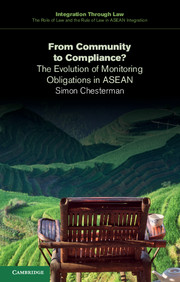2 - The Purposes of Monitoring
Published online by Cambridge University Press: 05 March 2015
Summary
As the survey of ASEAN practice demonstrates, monitoring has been undertaken in a variety of forms and, implicitly, for a variety of purposes. This chapter seeks to elucidate those purposes and offer a tentative evaluation of the suitability of the monitoring mechanisms that have been established. Chapter 3 will then offer a more general survey of structures and processes available.
As indicated in the Introduction, monitoring is often understood as the gathering of information on compliance with or implementation of certain obligations. The survey of ASEAN practice is consistent with this, for example AMRO's role in ensuring compliance with the CMIM agreement, or the AMM's role in monitoring implementation of the peace agreement in Aceh. But limiting analysis to these categories would not encompass the various occasions in which nominal monitoring takes place without meaningful efforts to link the mechanism in question to substantive or formal compliance.
As outlined in the Introduction, this chapter distinguishes between five discrete purposes for which monitoring appears to have been undertaken in the ASEAN context. The first two are the familiar categories of compliance sensu stricto, in the sense of substantive compliance with an obligation, and implementation, in the sense of formal compliance with an obligation. In addition, however, the ASEAN experience suggests three additional categories of analysis: interpretation, meaning that monitoring clarifies or provides an authoritative interpretation of an obligation; facilitation, denoting the purpose as being supportive of parties’ efforts to comply with an obligation; and symbolism, a final category in which there is no clear purpose for an intentionally weak mechanism beyond suggesting that an obligation is important enough for compliance to be desirable.
Compliance Sensu Stricto
Mechanisms to evaluate substantive compliance may be formal or informal: the defining characteristic is that monitoring is explicitly linked to the evaluation of success in achieving a specified outcome. This presumes, among other things, that the outcome is in fact specified.
- Type
- Chapter
- Information
- From Community to Compliance?The Evolution of Monitoring Obligations in ASEAN, pp. 59 - 78Publisher: Cambridge University PressPrint publication year: 2015



